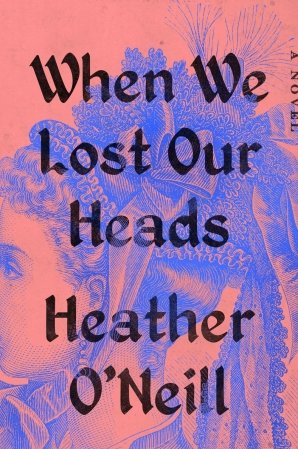Meaghan Flokstra
Heather O’Neill, When We Lost Our Heads.
Toronto: HarperCollins, 2022. $32.99.
Set in late nineteenth century Montreal, Heather O'Neill’s When We Lost Our Heads entangles readers in the lush, dark world of two powerful young girls who are passionately in love with one another. Heiress to a sugar empire, Marie Antoine is enthralled by Sadie Arnett’s intellect and morbidity, while Sadie is drawn to Marie’s boldness and charisma. A lethal mistake tears the two girls apart and sets them down vastly different paths, but they can never stay apart.
Marie and Sadie’s untouchable and unquenchable passion goes beyond tropes of forbidden love, and their sexualities bend the walls of the tidy, convenient boxes of heteronormativity. They devour the macabre and find joy in upsetting social sensibilities. No matter how far they stray from each other, they maintain a sense of understanding that no one else can possibly replace.
Both girls reflected on what their conversation must have sounded like to an impartial listener who had not descended by degrees into their madness. And they began to laugh. In truth they were delighted by their indecency.
While Marie inherits the sugar factory and doubles down on the tyrannical rule over its workers, Sadie finds herself in a brothel writing erotic novels. All the while, the working class women and girls of Montreal band together to fight for their rights. Set in a time when women had little agency, When We Lost Our Heads empowers its female characters to be raw and ruthless and real. These women feel so incredibly genuine and yet also impossibly larger-than-life. They are not perfect, and they are not always likeable. They hurt themselves and each other, and they disagree with one another about feminist and class issues. Their flaws make them authentic, and their differences create space for nuance.
What most enthralled me about this novel is the way that O’Neill develops secondary characters by deftly weaving together several parallel stories at once. Marie’s working-class half-sister Mary, for example, haunts the Antoine family as a shadow of who Marie could have been if born into different circumstances, but she does not merely exist as a plot device. Instead, Mary overflows with ambition. Each character, no matter how minor, feels as if their life extends well beyond the pages of the book.
I was particularly drawn to George, a gender-nonconforming brothel midwife, abortionist, journalist, and agent of the revolution. Queerness is so often treated as a twenty-first century phenomenon, and it was incredibly refreshing to read a historical novel that allows queer identities to flourish naturally and beautifully. George encompasses and expands beyond traditional concepts of masculinity and femininity, and her struggles with gender identity feel both contemporary and true to the time period.
George wondered whether teetering between the genders made her impossible for people to take seriously. Perhaps it was because she did not really identify as a man or a woman that others could not see her as a proper person who had feelings and dignity and as much need for love as anyone else did.
All of these character's lives become increasingly intertwined until the story comes to its dizzying, breathless peak. When We Lost Our Heads mesmerizes from start to finish with its beautiful, gruesome explorations of power, desire, sex, money, and love. I was not able to put this book down any more than Sadie and Marie were able to let one another go.
MEAGHAN FLOKSTRA
is the Editorial Intern for The Ampersand Review of Writing & Publishing. A multidisciplinary artist raised in Hamilton, Ontario, Meaghan currently studies Creative Writing & Publishing at Sheridan College in Mississauga.


